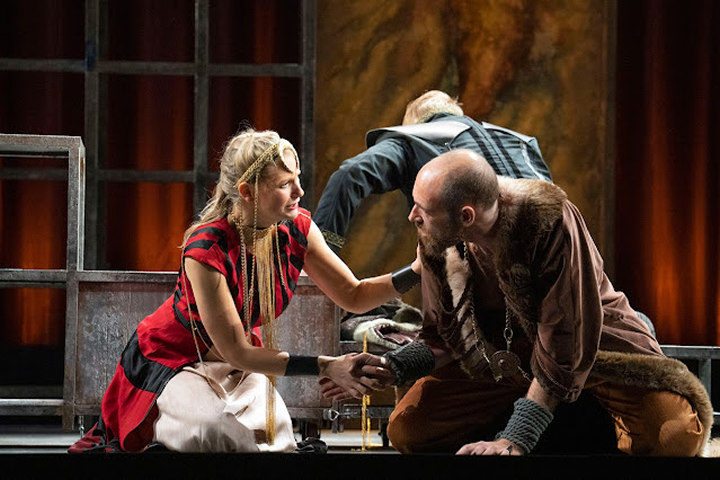| Opera Reviews | 28 April 2024 |
A performance that is difficult to forgetby Catriona Graham |
|
Handel: Tamerlano |
|
 |
|
|
Handel’s Tamerlano is a most serious opera, with none of the convolutions of plot we may expect. With a tight cast of five, none of them bit parts, it is intense and, in this production, the set remains the same throughout, to accentuate the prison in which the characters find themselves. Briefly, Tamerlano has defeated and imprisoned Bajazet, the king of Turkey, who we first see during the overture, caged, and crawling with lice and fleas. Jorge Navarro Colorado is so convincing with his scratching that this reviewer had to ignore a sympathetic itch. Andronico, who has allied with the victorious Tamerlano, is in love with Bajazet’s daughter Asteria, and intercedes, so he can free Bajazet at least from the cage. Only Tamerlano quite likes the look of Asteria, despite the fact that Irene is en route to marry him. Rodrigo Sosa dal Pozzo is a strong Tamerlano, his singing forthright and robust, a thuggish smile on his face and in his voice; he stalks the stage menacingly like a genial Vinny Jones. He is the conqueror. In his worldview, Bajazet is a loser and Asteria the spoils of war, if she is not prepared to be co-operative. There are many ways of reading this opera; the director’s note puts Asteria at its heart but on the stage it is the contrast between Tamerlano and Bajazet which catches the attention. Colorado’s Bajazet may have been deposed and be imprisoned, but he retains agency. His acting is superb – released from the cage, his muscles are weak and he can barely stand. We see him stumble and fall, and, eventually, by pure will, hold himself upright and walk. He craves death, but this is not death in preference to dishonour, the equivalent of the bottle of whisky and the loaded revolver, or even death as a release. This is death as a positive act and, when it comes, after he has taken the poison he has carefully curated, its effect on Tamerlano is as great as on his daughter and Andronico. And he does this all while singing beautifully. Ellie Laugharne is her father’s daughter. Asteria does not accept her fate passively, but she is constrained by Andronico’s reticence in expressing his feelings for her. She works out her own plan to thwart Tamerlano; when it all goes wrong, Se potessi un dì placare is a powerful expression of her situation. Irene (April Koyejo-Audiger) knows what she is entitled to and is going to get it. When Asteria challenges her, No, che sei tanto costante is her no-nonsense response, with rippling woodwind accompaniment. Andronico, is caught between politics and love, and afflicted with emotional reticence. James Hall portrays his uncertainty – is this the right moment to make a declaration to Asteria, should he stand up to Tamerlano – as well as his gentleness and tenderness to the incarcerated Bajazet. Tim van ‘t Hof floods the backcloth of the Rebecca van Beeck’s stark, industrial-looking set with colour – blues, reds – catching the changes of time and mood. With Jonathan Peter Kenny conducting The Old Street Band – whose playing is crisp – and James Conway directing, this performance is difficult to forget. |
|
Photo © Richard Hubert Smith |
|







